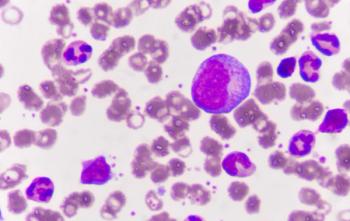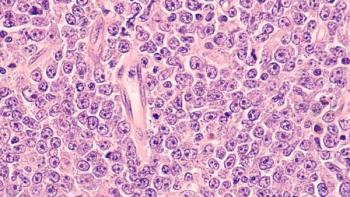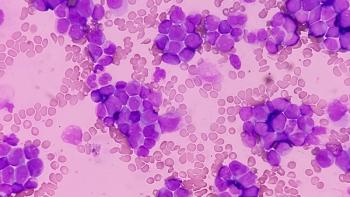
Subcutaneous daratumumab plus teclistamab improved survival outcomes in patients with R/R multiple myeloma vs standard daratumumab-based regimens.

Subcutaneous daratumumab plus teclistamab improved survival outcomes in patients with R/R multiple myeloma vs standard daratumumab-based regimens.

Preoperative radiation and pembrolizumab improved T-cell infiltration in patients with higher-risk, HR-positive, HER2-negative, early-stage breast cancer.

Phase 2 data demonstrated similar pharmacokinetic profiles between subcutaneous azacitidine and an oral combination of azacitidine and cedazuridine.

The use of sacituzumab govitecan to treat HR+/HER2– metastatic breast cancer did not reach its primary end point of progression-free survival.

Patients with relapsed/refractory large B-cell lymphoma treated with glofitamab or epcoritamab experienced early disease progression.

Lillian Rodich, PA-C, MPH, discusses how integrative oncology can give patients practical strategies for managing symptoms, regardless of financial barriers.

Six-month complete response with frontline axicabtagene ciloleucel predicts long-term survival in patients with high-risk large B-cell lymphoma.

Dexamethasone reduced the severity of ICANS but did not impact the rates of ICANS or CRS in patients with LBCL receiving axi-cel.

Phase 3 trial results demonstrated a significant benefit with the BTK inhibitor pirtobrutinib vs bendamustine plus rituximab in patients with untreated CLL/SLL.

Subcutaneous bispecific antibody cevostamab demonstrated early efficacy and safety in patients with relapsed or refractory multiple myeloma.

Pirtobrutinib demonstrated noninferior response rates to ibrutinib and showed a trend toward survival benefit in patients with CLL/SLL.

Patients with AML receiving azacitidine and venetoclax had significantly higher quality of life than those receiving intensive induction chemotherapy.

Blinatumomab/ponatinib increased efficacy, and response rates were improved in patients with Philadelphia-positive acute lymphoblastic leukemia.

The addition of epcoritamab to R2 significantly reduced the risk of death or disease progression in patients with relapsed/refractory follicular lymphoma.

Older patients with newly diagnosed diffuse large B-cell lymphoma receiving epcoritamab plus R-mini-CHOP achieved deep responses with manageable safety.

Shifting to a higher and less frequent dose of axatilimab was tolerable and feasible in patients with chronic GVHD.

KRd demonstrated higher PFS, deeper response, and greater MRD negativity compared with VRd in newly diagnosed multiple myeloma.

The combination of odronextamab with CHOP chemotherapy showed early efficacy in patients with untreated diffuse large B-cell lymphoma.

Nearly one-third of families of children with acute lymphoblastic leukemia developed “catastrophic” financial toxicity during the patient’s treatment.

Higher LDH levels were linked with poorer survival outcomes in patients with relapsed and refractory multiple myeloma who received elranatamab.

The primary end point of EFS was met in patients given conditioning without TBI, along with allogeneic HCT in a subset of patients with B-ALL.

Fixed-duration venetoclax combined with obinutuzumab or ibrutinib produced noninferior PFS compared with continuous ibrutinib monotherapy.

Race was identified as an independent prognostic factor in patients with AML receiving intensive chemotherapy.

Danielle Blair, RN, BSN, OCN, CCRP, explains what her role as an adolescent and young adult nurse navigator in oncology entails.

The FDA has approved the use of lisocabtagene maraleucel in patients with relapsed/refractory marginal zone lymphoma.

Nurses play a key role in helping patients with cervical cancer weigh the risks and benefits of radiation and concurrent chemotherapy.

The FDA has approved pirtobrutinib treatment for adults with relapsed/refractory CLL/SLL who have received prior treatment with a covalent BTK inhibitor.

What should nurses know about treating patients with KRAS G12C-mutated metastatic colorectal cancer using adagrasib and cetuximab?

A patient acuity model drove efficient and safe staffing through data from a natural language processing model informed by oncology nurse insights.

Catch up on recent regulatory decisions by the FDA in oncology, including actions in lung, hematologic, genitourinary, and gastrointestinal cancers.